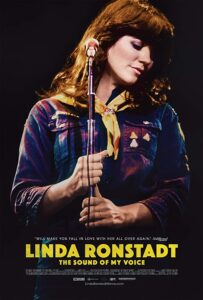Entertaining biography of a nice person with a golden gift.


After watching “Linda Ronstadt: The Sound of My Voice,” you will come away with the impression that the cross-over singer who dominated the charts for decades was one of the most giving and nicest people in the industry. And while that might be true, it doesn’t make for great cinema. This isn’t a story of a troubled artist who struggled for acceptance and harbors regrets. As entertaining as the film is, with the music and the nostalgic trip, it doesn’t give us a sense of who its subject really was and what made her such a star.

The Oscar winning and nominated directing team of Rob Epstein and Jeffrey Friedman stay away from almost everything controversial in Ronstadt’s life. While her relationship with California Governor Jerry Brown is covered, he’s not interviewed. There is a discussion about marriage (she never married), but it is spoken about at arms length. The detachment from deeply personal matters will leave the viewer with a number of questions.
It’s clear that Epstein and Friedman intend to focus on the music first and foremost. Through interviews with notable music professionals and artists, we do get a solid picture of Ronstadt musically. Her background and makeup influenced her style and eventual choices, that culminated in singing traditional Mexican ballads in Spanish. This is where the film will charm viewers, many of which may not be familiar with this side of the performer.
Ronstadt reveals through voice over that she is battling Parkinson’s disease, which has left her unable to sing. The sadness of this diagnosis is spoken about, however, it is revealed in the film’s opening sequence. While it is already a well-known fact, this movie does not spend time building up to the moment when she had to retire from singing. One would think that that event would have been significant, and if a narrative film were to be mounted about the artist, it might provide an emotional conclusion. There are few epiphanies uncovered here.
Ronstadt is very blunt about her illness, talking about it without much hint of regret. She talks about her inventor father and how his mother suffered from the disease. One wonders if the family was plagued by fear that it would be passed onto one of them. And, of course, it was passed on. But instead of focusing on the disease, Ronstadt’s battle with it, and her life after leaving singing, we get more or less a history lesson annotated by the singers, professionals, and musicians that worked with her. And that’s fine, only it does not elevate the movie above a VH1 profile or even a movie that captures a moment in music history.

However, there are a few choice segments in “Linda Ronstadt: The Sound of My Voice” that caught me. Epstein and Friedman, armed with significant resources, have acquired some wonderful archived footage including lengthy interviews done on the beach, perhaps, during the 1970s. Ronstadt walks along shoreline and talks about the differences between men and women singers. It’s profound and gave me a lump in my throat.
Here’s a gifted artist that survived all the perils of a brutal industry that put her behind her male counterparts, an industry where so many succumbed to drug abuse and other ruining vices, and yet, her voice is taken from her by a crippling disease passed to her genetically. If only this movie could have captured those emotions and carried them to a revealing conclusion. Perhaps it’s enough that the viewer can do that heavy-lifting himself or herself, but “Linda Ronstadt” The Sound of My Voice” is a just good movie with elements of a great one here and there.

NOTE: This film would make a good double feature with “David Crosby: Remember My Name.” Crosby, who provides a lengthy interview similar to Ronstadt here, gives us a little more controversy and grit, but it’s clear that his self-destructive behavior is exactly what Ronstadt is talking about while she walks and talks on the beach. One film is about a good person, however, and the other….
